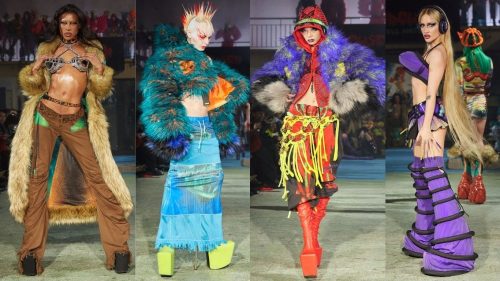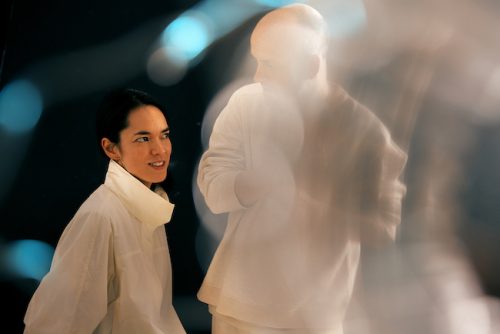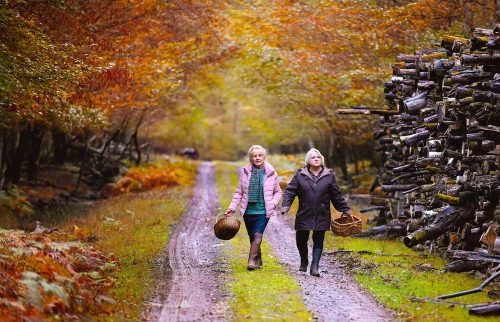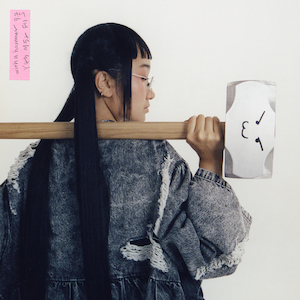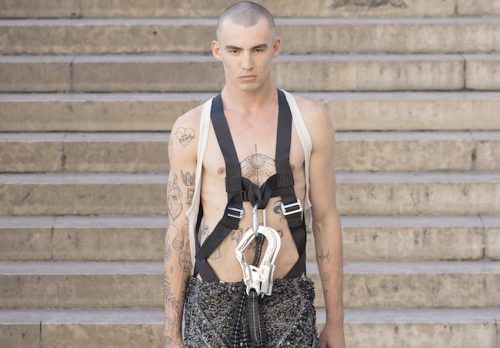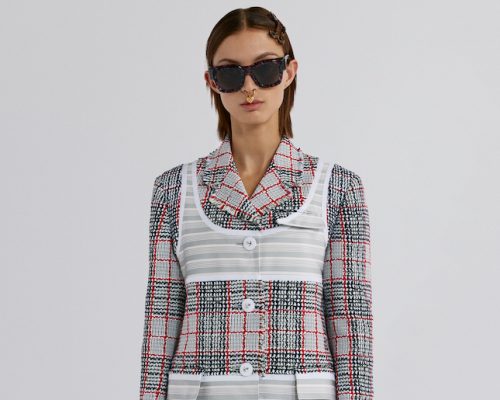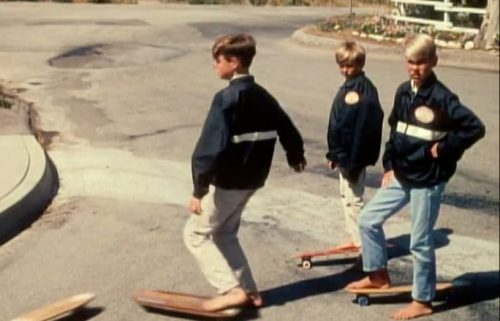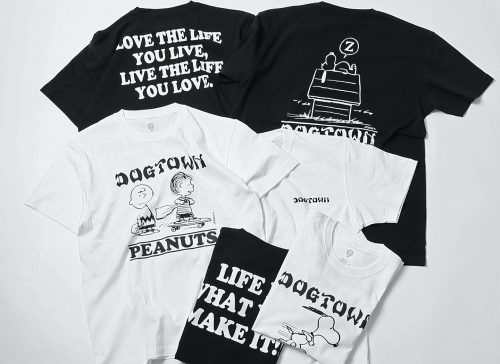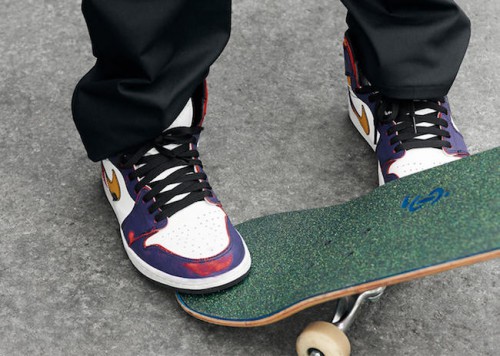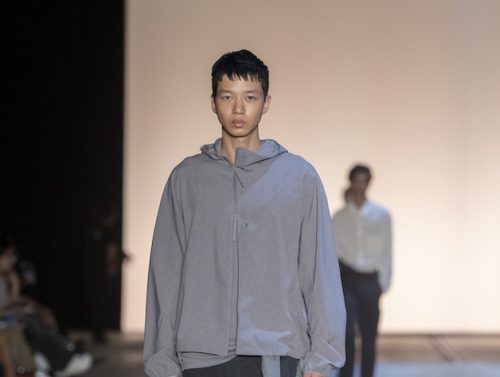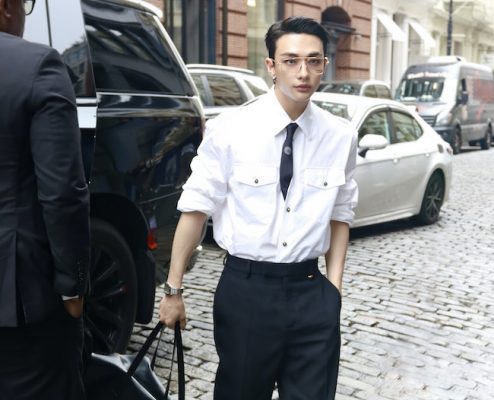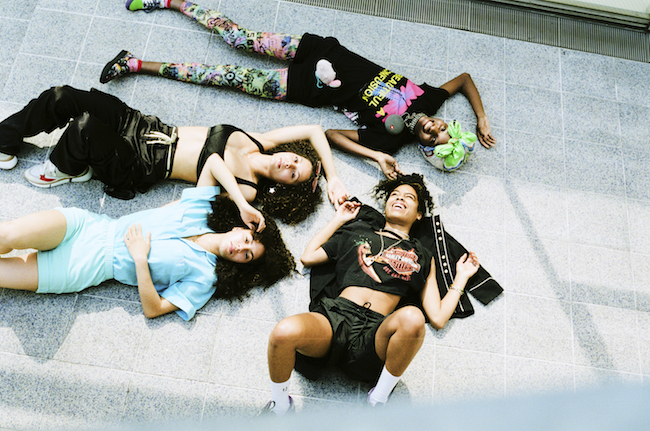
――Congratulations on the film. We are so excited to have you here, and a lot of Japanese kids are very excited to see the film.
All: “Thank you!”
――First of all, how did you start the Skate Kitchen?
Kabrina “Moonbear” Adams: “We did a short film for Miu Miu (‘That One Day’), and that’s how we started hanging out. Before that, we knew each other separately. I saw you guys (Brenn and Jules) at Chelsea.”
Jules Lorenzo: “I knew you through Nina (Moran.)”
Kabrina: “Yeah, everyone knew each other through Nina.”
Ajani Russell: “Some of us went to school together.”
Kabrina: “I didn’t know Ajani yet, until we started filming.”
Ajani: “I knew who you were, but we weren’t friends.”
Kabrina: “Yeah, we never hung out or anything. Everybody else I met through Nina at Chelsea.”
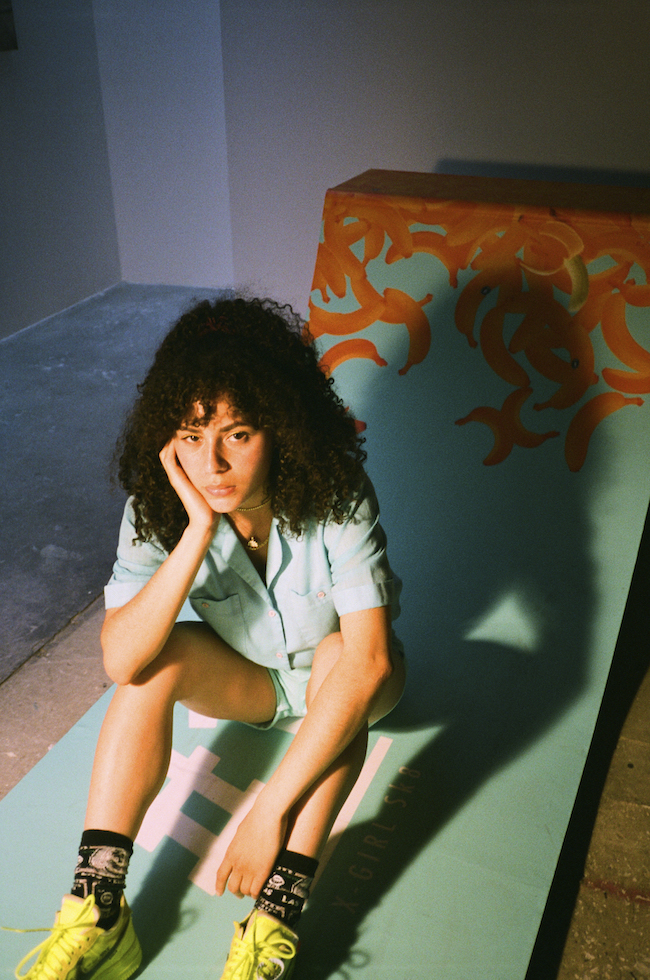
――When did you start calling yourselves the Skate Kitchen?
Kabrina: “I think it was that weekend that we were filming. That’s when the Instagram was made.”
――What does the Skate Kitchen mean?
Ajani: “So we make wherever we are the kitchen, and that is deliberative of the stereotype that women belong in the kitchen. Rachelle (Vinberg) would see comments on YouTube videos of female skaters like, “get back to the kitchen and make me a sandwich” like very rude things. So it’s basically reappropriating that stereotype. When we are in the kitchen, we can do whatever the f*** we want.”
――What was it that got you interested in skating in the beginning?
Kabrina: “Tony Hawk! We actually skated with him. It was so crazy!”
Jules: “He was so cool! We went to New Jersey to skate, because there is his huge ramp that’s like 14 feet deep. I was trying to skate one part of it, but I kept falling down the ramp every time I tried to go. And then he came over and he was like “Hey, try pumping up the wall a bit harder, it helps you go down easier.” And then I did it! I was like ahhhh! [laughs]”
――What about you guys? What was it that got you interested in skateboarding?
Jules: “We saw our next-door neighbor skating when we were younger, when I came back from school. Our dad used to skate when he was younger, and so our mom got my sister and I skateboards. They would bring us to skate parks all the time, so we just kind of continued. And when we came to New York, it was the same thing. We found skate parks and we just go to it.”
Ajani: “I started when I was 17. I watched this TV show called “Rocket Power” and there was this girl called Reggie on it. And I always wanted to skate, but then I was scared. And then Nina built me my first board. She was like ‘now you can’t say you can’t skate.’ So I’ve been skating since then.”
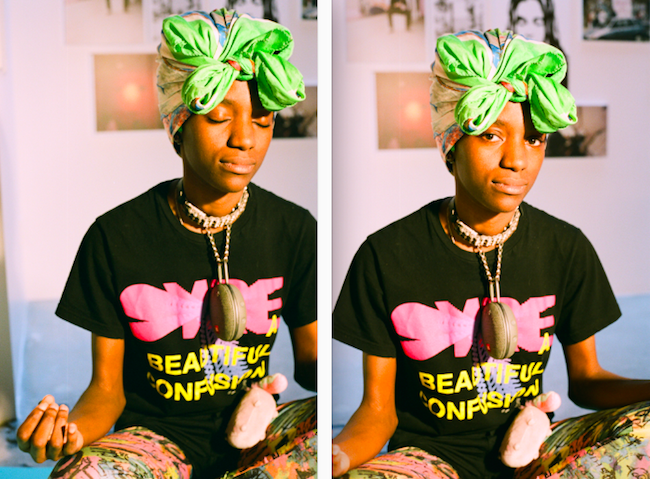
――Is that true that the director, Crystal Moselle talk to you guys on the train?
Jules: “Yeah, she ran into Nina and Rachelle. I remember Dede (Lovelace) said ‘this director wants us to meet up. Because she’s doing a short film and she wants to talk to you guys and a couple other girls.’ So we met Crystal at the park and talked for a while, just about skating and tons of different things. We got to know her and she got to know us. And we went on to shoot the short film.”
――Crystal was not a skater, right? Did she spend some time with you guys before filming to understand your world?
Kabrina: “Yeah, she spent a lot of time with us.”
Ajani: “We spent a lot of time with her [laughs.] Yeah, we were at her house.”
Kabrina: “We were hanging out with her for a year before we started talking about the movie, Skate Kitchen.”
――This film has a storyline, yet it feels so authentic and feels almost like a documentary. Were you guys involved in the script writing process?
Brenn Lorenzo: “For the script writing process, Crystal brought us all together and we all sat and talked to her, and told her different life experiences we’ve had, whether it’s through skating or just other general life experiences. And she took all those things and put them into the script. That’s why the movie comes across in such a realistic way. Even though it’s scripted, there was a lot of stuff that we’ve actually being through, and lots of stuff we genuinely say. So it all felt really natural when we were doing certain scenes. And also, since we are all genuinely friends with each other, it made it easier for us just to have a good connection, and there was a lot of chemistry with one another. So I think that’s why it has such an authentic feel to it.”
――I also loved the way you dressed in the film. You guys dressed very differently from one another.
Kabrina: “Those are our own clothes.”
Ajani: “I wore these in the movie [laughs.]”
――How was it like working with Jaden Smith who played Devon in the film? I didn’t know that he skates.
Kabrina: “Yeah, he can skate. He didn’t have any… what do you call those people that fill in for you?”
Jules: “Stunt doubles?”
Kabrina: “Yeah, he didn’t have a stunt double.”
Jules: “He was really cool. He was fun to be around, also we went to skate and he hung out with us, too. It was nice working with him.”
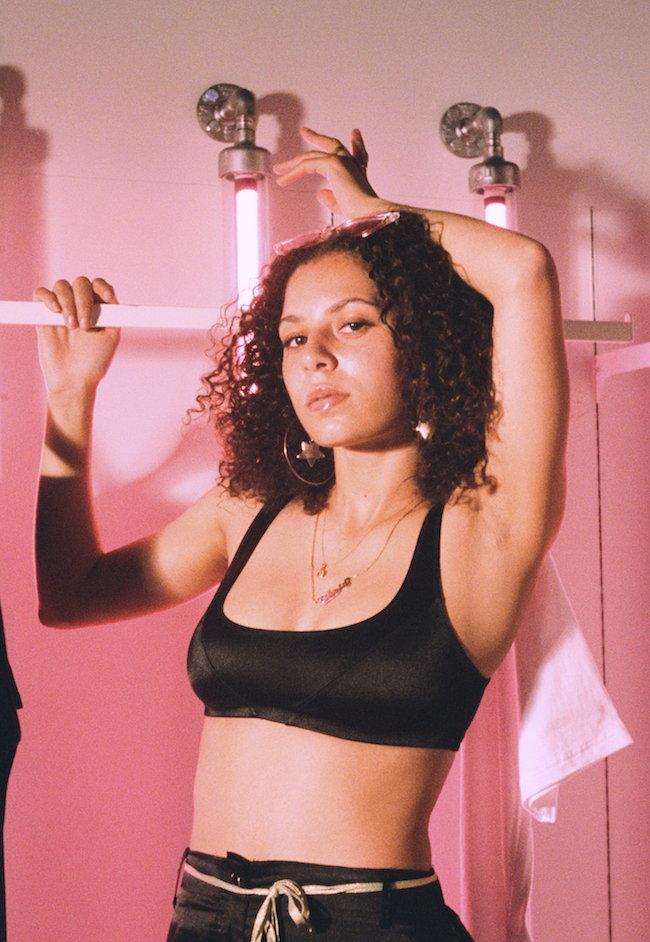
――How was this whole experience filming with your friends and now you are in a feature film together?
Jules: “It was a lot of fun for me, especially since it made me skate so much more than I was. I guess I skated a lot and then I stopped for a bit, and this movie made me realize why I love skating so much again. First of all, it made me skate a lot more. Second of all, it introduced me to a lot of friends that I have now. And it also opened up tons of opportunities for us whether it’s traveling or job opportunities or meeting new people and stuff like that.”
――Are there anything that changed after this film?
Brenn: “I started seeing a lot of female skaters. There’s just so much more than I did. When I first started skating, I didn’t see any girls. Now there is a bunch all over the world. It’s not even just New York or the United States, it’s worldwide, so it’s really really nice.”
――I think this film and you are going to be a big inspiration for a lot of Japanese girls as well, especially skater girls.
Kabrina: “We know some!”
Jules: “When we first came here, we met a group of skater girls and they are all super good, too!”
――That’s nice to hear because I know some girls are a bit intimidated by guys at skate parks.
Jules: “Guys can be very intimidating, especially when it’s a male-dominated space. You go in and you see you and your friend are only girls, and there are like 20 – 30 guys at the park, it’s like, “I’m the only girl here!” I know sometimes, say when you’re just starting out, sometimes you feel self-conscious about how you skate, and be like ‘oh I can’t do this trick, so I’m not that good.’ But eventually, as you continue doing it, you learn to not care about what level you are at, but it’s just about having fun.”
――I see.
Jules: “I think having this platform is really good, because we are able to show girls just like women supporting each other. And none of us are trying to be pros, and none of us are professional skaters. We are all different and are going to have fun skating and that’s the main thing. We just want to have fun. That’s what we’re always trying to show to motivate girls to get there and do what they want, even if they don’t see themselves in that space and just have fun. Don’t care what other people think of you, and stuff like that.”
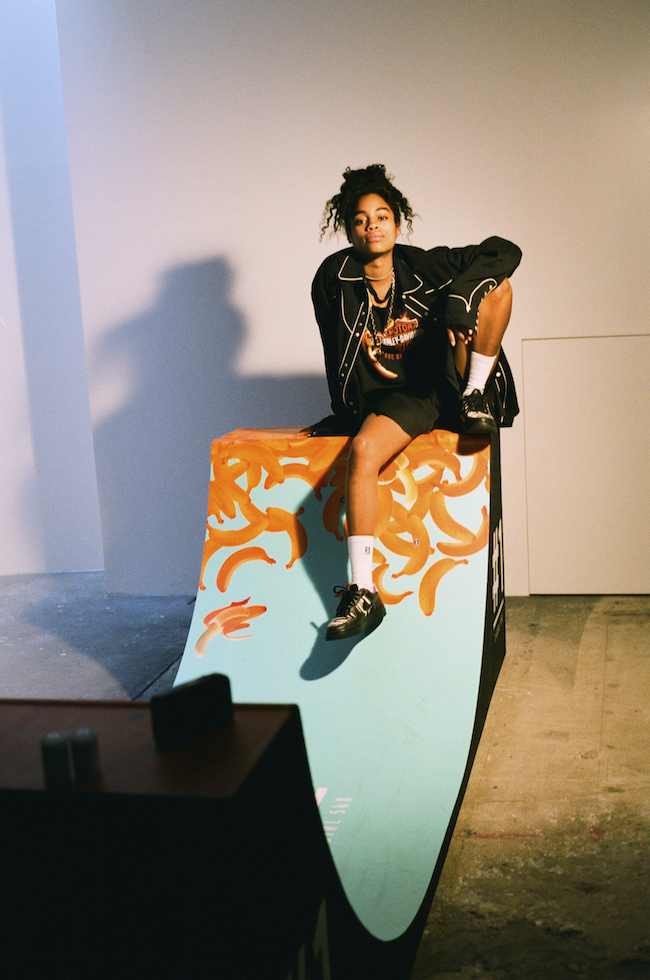
――There are many skate movies that are about competitions, but this one is not and I really loved it.
Jules: “Exactly! It’s funny because one of the scenes that didn’t make into the film was like a competition scene. But then it just didn’t really fit into the movie, so they took it out. And I can think that it worked even better, because tons of skate movies are basically all about competition. But I think our film is more realistic, because not too many of my friends do competitions. Only a few amount of skaters that I know genuinely try to compete and do stuff. The rest of us just skate for fun, and that’s what this film is showing, people hanging out skating, being a f***ing teenager and just doing what you want [laughs.]”
――Speaking of competitions, skateboarding is going to be in Tokyo 2020.
Jules: “Yes!”
Kabrina: “I’m coming back.”
――There are different opinions about skateboarding in the Olympics, but what do you think about it?
Jules: “The Olympics and skateboarding is very interesting. I think there are pros and cons to it. Pros – because it puts skateboarders on a broader platform and it gets way more attention. Because now not everybody is looking at it, paying attention to it.”
Brenn: “There is a lot negative stuff about skateboarding, so it would bring more positive stuff to it.”
Jules: “However, also, it’s just always weird when it comes to judging skateboarding. Even when they have Street League, somebody could do a kick flip but have a lot of style to it, and somebody could do a treflip but just looks like, alright whatever, even though it’s a harder trick. So when it comes to judging it, for me, it’s like how you are going to judge who’s the best? So that is one thing that’s interesting to think about. But it’s going to be cool, and I’m excited to see who’s going to be on the team for it.”
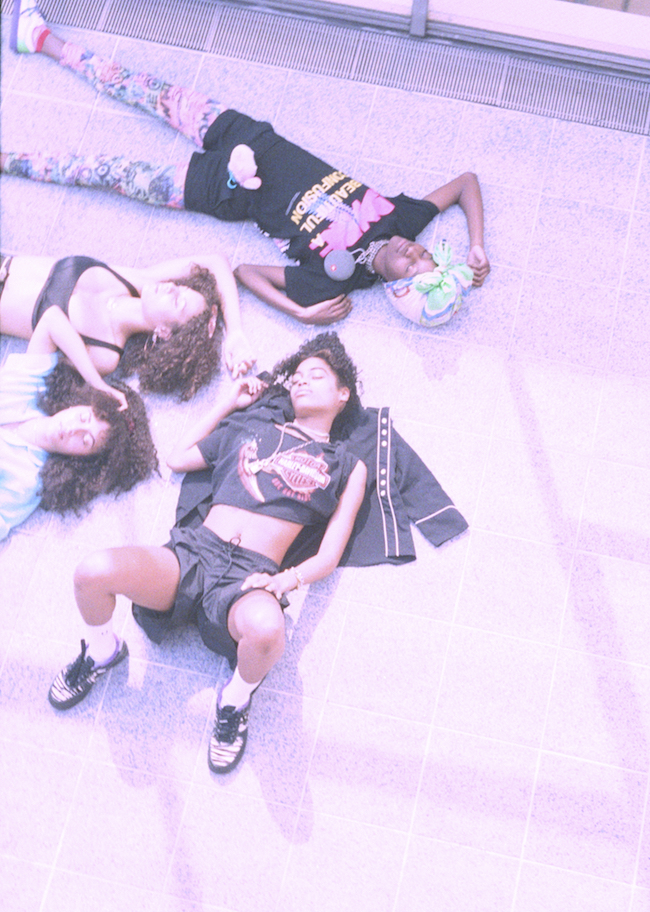
――This film is not just about skating but there are elements of feminism, sexuality, friendship, problems with your parents and etc. What were some of the things that you wanted to convey through this film?
Jules: “One of the things that I wanted to convey was showing women of color especially on the screen, as not just side characters but being the front and center main characters of the film. Because when I grew up, even just for skating in general, I didn’t see too many black girls or Hispanic girls skating.”
Ajani: “I didn’t see any.”
Jules: “Yeah, it’s usually only white girls.”
Ajani: “Not until like 2014!”
Jules: “Exactly!”
Ajani: “Until they discover Jenn Soto and Samarria Brevard.”
Jules: “Yup. For a while, I’d think like “OK, there are no girls who look like me skate.” And I can think this film shows not only women of color skating, but just women of color being in these spaces and existing, being on screen showing that you don’t just have to have a white experience to make a movie [laughs.]”
――What do you love the most about skating?
Jules: “I just love how it just made me believe in myself for a lot of stuff. I know when I try certain tricks, at first I’m like I can’t do this. But then, how do you expect to do anything with that attitude? You can apply the way your mentality for skating for anything else in life. If I believe I want to do something and keep trying and doing it, I’ll eventually get it. You can apply it to anything you want to do.”
Brenn: “It’s just a nice break from everything else that you are doing. Because as long as you can just have fun and really hang out with the people who bring you happiness, and it’s just nice to skate from any other outside stresses.”
Ajani: “I really like how it challenges myself in a physical, mental space. It really forces me to quiet my mind with all my self-doubts and fears. Also, once you start landing tricks, it’s addictive.”
Kabrina: “I just like how it’s integrated into everyday life. I don’t need to go to the skate park everyday to be a skateboarder. I just need to take it with me, skate down the street and I’m good.”
――What would you like Japanese audiences to take away from this movie?
Kabrina: “I think as long as it brings something positive to their lives, then it’s ok.”
Jules: “Yeah, it doesn’t have to be anything particular. It could give you whatever anybody wants, just something positive.”
Ajani: “My life thing that I’d like to live by is not to let myself to be ruled by fear. And I told Crystal when we were making this movie that I wanted it to be very empowering. So I hope that essence is viewed from the audiences here.”
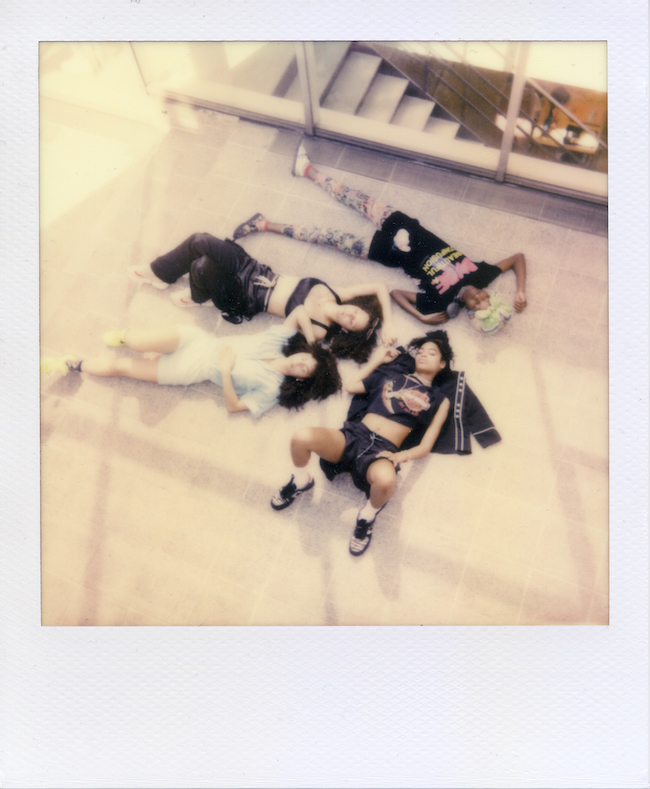
photography Ryosuke Yuasa
text Nao Machida
edit Ryoko Kuwahara
